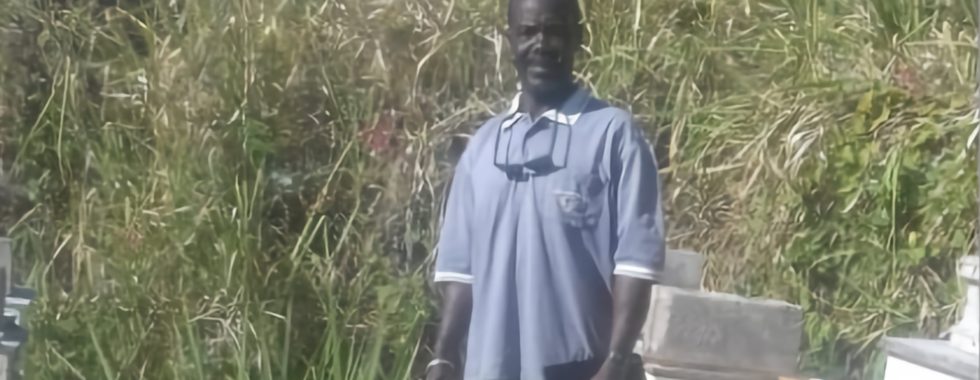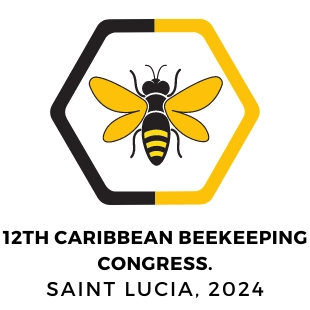Vibration Beekeeping!
The vibrations of bees are well-known; their rapid wing beat causes the air surrounding them to vibrate, that vibration reaches our ears, and we interpret that vibration as a buzz. Bees are also essential to life [1]. When you look at another definition of a vibration it is a perfect fit for St Kitts’ beekeeping in other ways: “Vibration – a Universal Life Energy……higher vibrations…are associated with empowering thoughts, positive emotions, good health and strong spiritual awareness” [2] reflects the main approach used by many of the active beekeepers across the island.
Take Oliver Richards as an example. A man that knows that change is a necessity, not a choice. A mason by training, a former pig farmer and now moving into honey farming, Oliver is typical of the steadily increasing group of beekeepers on the island who accept that the key to survival is adaptation and positive vibrations.
He practices his beekeeping with a sense of purpose and commitment to growth and acknowledges that over the years, he has developed his unique approach to beekeeping using a combination of practical experience, shadowing and supporting others and exploring the advice and information available on the internet. He stated that:
“I used to label the hives and write down when I set up the hive and when I extract the honey and so on, but over time I’ve found that just watching and checking the boxes regularly is what works for me”.
Oliver finds that climate change has also contributed to him modifying his approach. With the ‘dry season’ getting longer and the inconsistencies of solar radiation and wind across the year, he has had to all but abandon a methodical approach to managing his hives according to seasonal changes.
This is not an unusual phenomenon, but rather it is a threat across the whole Caribbean. Entomologists have been yearning for more research to be done in all small-island developing states (SIDSs) in particular. With such unpredictable climatic conditions in the Caribbean, the potential influence of climate change on bee foraging activity and flight needs to be more properly understood. Climate change of course is also likely to impact on the presence of predators and pathogens and the availability of flowering plants [3].

Keeping hives in a shaded area will be vital protection as global temperatures rise.
Another type of vibration of course is the furious fanning that bees have to do to keep the hives cool when temperatures rise. In addition, to lower the temperature of the hive, bees may begin “bearding” outside the entrance of the hive. This is when large numbers of bees work outside of the hive which helps to keep the inside of the hive cool. At other times, it is a sign of an imminent swarm.
“One day I noticed the cover was slightly off of one of these hives and I went to work and come back and when I went back to look in the hive, I found that the combs had melted. The temperature was too hot in the day. I was lucky they didn’t swarm. Now as soon as I come into the area (where the hives are kept) I look around first and check the trees for swarms”.

Hives’ ‘bearding’ to keep the inside of the hives cool.
Oliver has now been beekeeping seriously for 5 years and is seeing an upswing in demand for his honey and other hive products. Moving into full-time beekeeping is beginning to look like his only option if he is to keep up with the renaissance in the public’s awareness of the numerous health benefits of raw, organic honey.

Raw honey contains natural vitamins, enzymes, powerful antioxidants, and other important nutrients. It has anti-bacterial, anti-viral, and anti-fungal properties, and promotes digestive health [4]
In the wake of the pandemic, the public have become increasingly concerned about the need to make their immune system more efficient and more importantly, the properties of raw honey [5]. Raw, local honey has been regarded for its ability to reduce allergies to pollen because it contains a blend of local pollen, which can strengthen an individual’s immune system. It is preferred as a sweetener for the local varieties of ‘bush tea’ and has long been used in combination with rum, lemon and hot water to relieve the symptoms of the cold virus [6].
Oliver is an active member of the St Kitts’ Beekeepers’ Co-operative and has been generous with his time and skill with the beginner and younger beekeepers. He is both optimistic and encouraged about the steady growth in interest in beekeeping locally. His main advice to anyone who wants to build expertise is to be curious, be diligent and in the words of a true vibration beekeeper “Go with the flow!”.
References
- Why Bees Matter so Much to Humans – One Green Planet
- What is “vibration”? – Bioresonants
- Forecasting the Influence of Climate Change on Agroecosystem Services: Potential Impacts on Honey Yields in a Small-Island Developing State (hindawi.com)
- Reasons To Buy Raw, Local Honey (betterhensandgardens.com)
- Prospects of honey in fighting against COVID-19: pharmacological insights and therapeutic promises – ScienceDirect
- Honey and Health: A Review of Recent Clinical Research (nih.gov)


